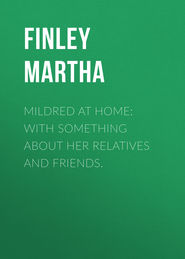По всем вопросам обращайтесь на: info@litportal.ru
(©) 2003-2024.
✖
Signing the Contract and What it Cost
Настройки чтения
Размер шрифта
Высота строк
Поля
“Hush, Dora,” whispered the lad, drawing his sister aside. “Can you not guess? have you forgotten our mother’s quest – her life-long sorrow?”
“Oh, Ellis! to be sure! How could I be so stupid! Oh, why didn’t I think to detain and question the man? But, Ellis, it wasn’t the right name.”
“No; but what is easier than to change a name?”
“Yes, yes, that is true! Poor mamma! poor dear mamma! She will never rest; she cannot, till she finds her or knows that she is no more.”
“She has such a loving mother-heart,” said Ellis, “and she will blame herself, though I’m sure she has no reason.”
“What are you talking about?” asked little Nan, coming skipping back from an erratic excursion into one of the side paths. “Oh, Dora! did you get me that necklace?”
“Yes, little puss, I have it safe here in my bag.”
“Let me carry that; I did not notice that you had it,” Ellis said, taking the satchel.
He was invariably as politely attentive to his mother and sisters as to any other ladies.
The parents were moving slowly forward, the mother having recovered her accustomed calm, quiet manner, and the young people had fallen slightly into the rear. Another moment, and they were all passing up the broad marble steps leading into Memorial Hall.
They had hardly disappeared within the portal, when Espy and Ethel might have been seen traversing the avenue in the same direction.
Indifferent as to which part of the building received their first attention, the foremost party turned, as it were by a mere chance, into that appropriated to the exhibition of native talent. They moved slowly along, the parents still in advance, pausing as others were doing, now here, now there, as one painting or another drew their attention.
Suddenly the lady grasped her husband’s arm, a low, half-stifled cry escaping her lips. Was it joy? Was it anguish? It seemed a mingling of both.
“What is it, wife?” he asked in a startled tone, and throwing the other arm around her, for she seemed about to faint.
“Look, look!” she said, pointing to Espy’s picture of the child, beneath which they were standing. “It is – it is my baby! my little Ethel! my lost darling!” she sobbed half inarticulately, gazing at it with streaming eyes.
“Ha!” cried her husband, “is it possible! My darling, are you sure?”
“Yes, yes, it is she! Could a mother’s eyes be deceived? Can a mother’s heart forget? And the woman – the one who took her from me! That is her face. I remember perfectly every lineament. Oh, Rolfe, Rolfe, it is my lost baby! And there,” pointing to the companion picture, “there she is, grown to womanhood! Is not this a clue?”
“Yes, yes; the artist – we must find him.”
Their tones had not been loud, yet, in connection with the lady’s evident agitation, had attracted some notice, and a younger pair had hurriedly pushed their way toward them, coming up so close in their rear as to catch the last two or three sentences.
“I am the artist,” said Espy, “and this,” glancing at Ethel as the others turned quickly at the sound of his voice, “is the original of those two – ”
“Your name? your name?” gasped the lady, gazing eagerly, longingly, into the pale, excited face of the girl.
“Is Ethel Farnese. My mother’s was the same; and she, a widow, poor, dying as she believed, gave me to that woman – Mrs. Kemper.”
“I knew it! I knew it! My child! my long-lost child!” and instantly they were locked in each other’s arms, Ethel sobbing:
“Mother, mother! my own darling mother!”
CHAPTER XXXIX
THE MADAME’S QUEST IS ENDED
“I cannot speak; tears so obstruct my words
And choke me with unutterable joy.” —
Otway.
“Were my whole life to come one heap of troubles,
The pleasure of this moment would suffice,
And sweeten all my griefs with its remembrance.” —
Lee.
Madame Le Conte had remained at home that day, had slept all the morning, and now, in the latter part of the afternoon, was occupying a lounging chair in her boudoir and amusing herself with a novel.
“Hark! wasn’t that a carriage stopping at our door?” she said, looking up from her book and addressing her maid. “Yes, there’s a ring.”
“Katty’ll go. It’s Miss Ethel come home early, I presume, Madame,” answered Mary, not troubling herself to rise from her chair.
There was the sound of Kathleen’s step in the hall, the opening of the door, a man’s voice speaking, then the girl came quickly up the stairs and appeared before her mistress.
“Mr. Alden, Madame, and he wants to know may he come up here and spake till ye? Oh, don’t go for to be scared! Miss Ethel’s all right,” as the Madame turned pale and half rose from her chair.
“Bring him up then,” she gasped, falling back again and panting for breath.
She put no faith in Kathleen’s assurance, and was terribly alarmed. To lose Ethel would be almost like losing her own life.
But one glance at Espy’s face reassured her.
“Ah, Madame,” he said cheerily, declining by a wave of the hand the seat she pointed to, “I met a gentleman out at the Centennial who says he is a very old friend of yours, and would like much to see and speak with you. I have brought him to the house, feeling pretty sure you would be pleased to see him, but thought best to give you a little warning and an opportunity to decline doing so if you wished.”
“Who is he?”
“He requested me not to give his name, as he is anxious to see if you will recognize him.”
The lady’s curiosity was aroused.
“Very well, I will see him,” she said. “You may bring him up here at once; I am quite ready for the interview.”
The stranger, apparently troubled with no doubt that he would be received, had crept noiselessly up the stairs and was already almost at the door of the boudoir. Espy had only to turn and give him a nod, and instantly he stepped forward and stood before Madame Le Conte – a tall, handsome, middle-aged man.
But he started with amazement as his eye fell upon her face and figure.
“Do I – do I see before me my old acquaintance, Nannette Gramont?”
“That was my maiden name,” she said, gazing earnestly into his face as she half rose and held out her left hand, “but I am greatly altered, as I think you must be also, for your looks are utterly strange to me.”
“Rolfe Heywood,” he said, taking the offered hand while still keenly scanning her face.
“Rolfe Heywood! is it possible? can it be? Ah, yes, I know you now; I remember your smile. But – oh, can you tell me anything of my sister – my lost Ethel – my darling Pansy?”
The words came pantingly, sobbingly, while great tears chased each other down the bloated, swarthy cheeks.
“Oh, Ellis! to be sure! How could I be so stupid! Oh, why didn’t I think to detain and question the man? But, Ellis, it wasn’t the right name.”
“No; but what is easier than to change a name?”
“Yes, yes, that is true! Poor mamma! poor dear mamma! She will never rest; she cannot, till she finds her or knows that she is no more.”
“She has such a loving mother-heart,” said Ellis, “and she will blame herself, though I’m sure she has no reason.”
“What are you talking about?” asked little Nan, coming skipping back from an erratic excursion into one of the side paths. “Oh, Dora! did you get me that necklace?”
“Yes, little puss, I have it safe here in my bag.”
“Let me carry that; I did not notice that you had it,” Ellis said, taking the satchel.
He was invariably as politely attentive to his mother and sisters as to any other ladies.
The parents were moving slowly forward, the mother having recovered her accustomed calm, quiet manner, and the young people had fallen slightly into the rear. Another moment, and they were all passing up the broad marble steps leading into Memorial Hall.
They had hardly disappeared within the portal, when Espy and Ethel might have been seen traversing the avenue in the same direction.
Indifferent as to which part of the building received their first attention, the foremost party turned, as it were by a mere chance, into that appropriated to the exhibition of native talent. They moved slowly along, the parents still in advance, pausing as others were doing, now here, now there, as one painting or another drew their attention.
Suddenly the lady grasped her husband’s arm, a low, half-stifled cry escaping her lips. Was it joy? Was it anguish? It seemed a mingling of both.
“What is it, wife?” he asked in a startled tone, and throwing the other arm around her, for she seemed about to faint.
“Look, look!” she said, pointing to Espy’s picture of the child, beneath which they were standing. “It is – it is my baby! my little Ethel! my lost darling!” she sobbed half inarticulately, gazing at it with streaming eyes.
“Ha!” cried her husband, “is it possible! My darling, are you sure?”
“Yes, yes, it is she! Could a mother’s eyes be deceived? Can a mother’s heart forget? And the woman – the one who took her from me! That is her face. I remember perfectly every lineament. Oh, Rolfe, Rolfe, it is my lost baby! And there,” pointing to the companion picture, “there she is, grown to womanhood! Is not this a clue?”
“Yes, yes; the artist – we must find him.”
Their tones had not been loud, yet, in connection with the lady’s evident agitation, had attracted some notice, and a younger pair had hurriedly pushed their way toward them, coming up so close in their rear as to catch the last two or three sentences.
“I am the artist,” said Espy, “and this,” glancing at Ethel as the others turned quickly at the sound of his voice, “is the original of those two – ”
“Your name? your name?” gasped the lady, gazing eagerly, longingly, into the pale, excited face of the girl.
“Is Ethel Farnese. My mother’s was the same; and she, a widow, poor, dying as she believed, gave me to that woman – Mrs. Kemper.”
“I knew it! I knew it! My child! my long-lost child!” and instantly they were locked in each other’s arms, Ethel sobbing:
“Mother, mother! my own darling mother!”
CHAPTER XXXIX
THE MADAME’S QUEST IS ENDED
“I cannot speak; tears so obstruct my words
And choke me with unutterable joy.” —
Otway.
“Were my whole life to come one heap of troubles,
The pleasure of this moment would suffice,
And sweeten all my griefs with its remembrance.” —
Lee.
Madame Le Conte had remained at home that day, had slept all the morning, and now, in the latter part of the afternoon, was occupying a lounging chair in her boudoir and amusing herself with a novel.
“Hark! wasn’t that a carriage stopping at our door?” she said, looking up from her book and addressing her maid. “Yes, there’s a ring.”
“Katty’ll go. It’s Miss Ethel come home early, I presume, Madame,” answered Mary, not troubling herself to rise from her chair.
There was the sound of Kathleen’s step in the hall, the opening of the door, a man’s voice speaking, then the girl came quickly up the stairs and appeared before her mistress.
“Mr. Alden, Madame, and he wants to know may he come up here and spake till ye? Oh, don’t go for to be scared! Miss Ethel’s all right,” as the Madame turned pale and half rose from her chair.
“Bring him up then,” she gasped, falling back again and panting for breath.
She put no faith in Kathleen’s assurance, and was terribly alarmed. To lose Ethel would be almost like losing her own life.
But one glance at Espy’s face reassured her.
“Ah, Madame,” he said cheerily, declining by a wave of the hand the seat she pointed to, “I met a gentleman out at the Centennial who says he is a very old friend of yours, and would like much to see and speak with you. I have brought him to the house, feeling pretty sure you would be pleased to see him, but thought best to give you a little warning and an opportunity to decline doing so if you wished.”
“Who is he?”
“He requested me not to give his name, as he is anxious to see if you will recognize him.”
The lady’s curiosity was aroused.
“Very well, I will see him,” she said. “You may bring him up here at once; I am quite ready for the interview.”
The stranger, apparently troubled with no doubt that he would be received, had crept noiselessly up the stairs and was already almost at the door of the boudoir. Espy had only to turn and give him a nod, and instantly he stepped forward and stood before Madame Le Conte – a tall, handsome, middle-aged man.
But he started with amazement as his eye fell upon her face and figure.
“Do I – do I see before me my old acquaintance, Nannette Gramont?”
“That was my maiden name,” she said, gazing earnestly into his face as she half rose and held out her left hand, “but I am greatly altered, as I think you must be also, for your looks are utterly strange to me.”
“Rolfe Heywood,” he said, taking the offered hand while still keenly scanning her face.
“Rolfe Heywood! is it possible? can it be? Ah, yes, I know you now; I remember your smile. But – oh, can you tell me anything of my sister – my lost Ethel – my darling Pansy?”
The words came pantingly, sobbingly, while great tears chased each other down the bloated, swarthy cheeks.











